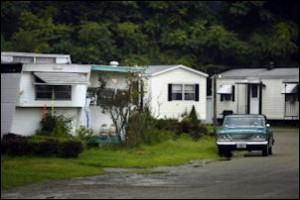Manufactured dwellings — mobile homes, trailers, call them what you will — are a major source of affordable housing in the United States. But a few market reforms would make them even more affordable to lower- and middle-income families and make them better vehicles for accumulating wealth. That was the message from a session Friday morning at the 2014 conference of the Congress of the New Urbanism in Buffalo, N.Y.
The great advantage of manufactured housing is that it costs less than site-built housing– $44 per square foot on average compared to $86 per square foot, not counting the value of the land, said Doug Ryan, director of affordable housing initiatives for the Corporation for Enterprise Development. But there are drawbacks. Many homeowners don’t own the land beneath their trailers and they cannot obtain long-term mortgage financing like other homeowners can. Also, zoning codes often marginalize manufactured housing, relegating trailer parks to undesirable locations, if permitting it at all.
Many problems with the industry originate from its origins decades ago when companies manufactured mobile trailers primarily as recreational vehicles. Over time, the trailers evolved into houses set in semi-permanent locations while campgrounds evolved into trailer parks. In 1976 legislation formally recognized the difference between “recreational vehicles” and “manufactured housing” but the underlying business model – RVs/mobile homes sitting on land owned by someone else – did not change.
Severing the connection between home ownership and land ownership created at least two big problems. First, trailer owners were subject to the whims of the landowner. In most states, trailer park owners could evict tenants for undesirable behavior or any other reason with only 30 days’ notice. If the landowner wanted to sell to a developer – boom – long-term tenants found themselves uprooted and forced to move to another location, if they could find one, at considerable expense.
Second, financing companies classified trailers as “chattel” property the same as RVs, which meant that homeowners could not access mortgage financing which charged lower interests rates and stretched out payments over longer periods. The second problem was tied to the first: The disconnect between the trailer and the land beneath it made it less desirable collateral for financiers.
Fortunately for mobile homeowners, a non-profit movement has arisen to address those problems. As Lisa Davis, program officer for the Ford Foundation, described it, reformers are moving across a broad front: changing the law to get manufactured housing titled as real estate; improving product quality with a focus on energy efficiency; solving the land-tenure problem; and reforming the financing system.
ROC USA, a not-for-profit enterprise, is addressing the land-ownership issue by converting trailer parks into land-ownership co-ops. It is impractical to subdivide trailer parks into individual lots for individual trailers, said Paul Bradley, president of ROC USA. But giving trailer tenants an ownership interest in a communal property does several positive things. It gives them equity ownership in the land, and it gives them security against the landlord selling the property and evicting them. Thirty years of experience has shown that homes in resident-owned communities sell faster and sell for more, allowing homeowners to build more equity.
Next Step Network is working on several initiatives to help trailer owners. The organization provides education and credit counseling to trailer buyers to ensure they make intelligent consumer decisions, and it works with the industry to make the costs and risks of ownership more transparent, said Dave Betler, marketing and operations specialist with Next Step. The group urges homeowners to look beyond up-front costs and look at life-cycle costs, which include energy payments. Manufacturing trailers to Energy Star specifications can lower monthly payments and increase re-sale value. Energy expenditures loom large for low-income families – twice the percentage of their income compared to average households.
Bacon’s bottom line: For the most part, I find these initiatives to be highly commendable. Instead of seeking government subsidies or engaging in social engineering, they are trying to make the market work more effectively. The goals of greater transparency and consumer education are laudable. Addressing the land-tenure issue by converting trailer parks into co-ops is inspired. Nudging the financial industry into providing mortgage financing sounds reasonable, although there may be complicating issues, such as the use of long-term mortgages that extend longer than the expected life of the trailer, that the panelists did not discuss.
The other reason I prefer this approach to many other affordable-housing initiatives is that it does not bilk taxpayer or turn lower-income people into wards of the state — it turns poor people into property owners and gives them a means to accumulate at least a small amount of wealth. That builds a much healthier society.



